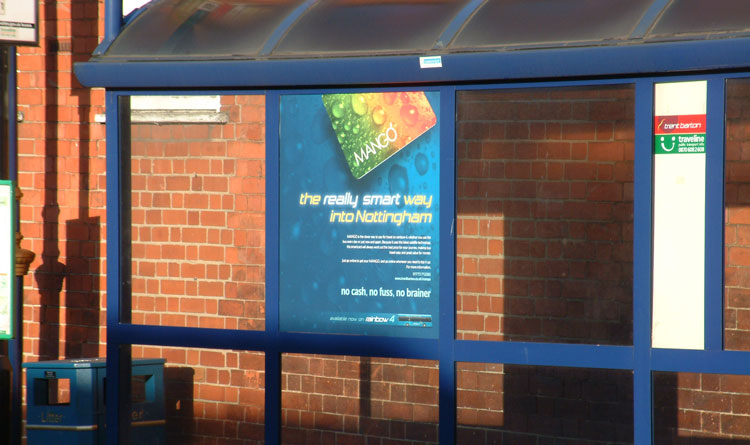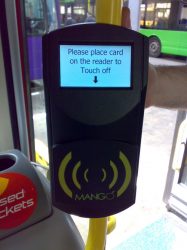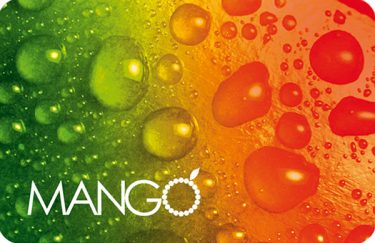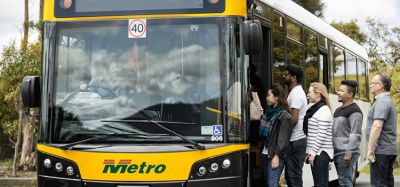MANGO: Trent Barton’s unique contactless smart card
- Like
- Digg
- Del
- Tumblr
- VKontakte
- Buffer
- Love This
- Odnoklassniki
- Meneame
- Blogger
- Amazon
- Yahoo Mail
- Gmail
- AOL
- Newsvine
- HackerNews
- Evernote
- MySpace
- Mail.ru
- Viadeo
- Line
- Comments
- Yummly
- SMS
- Viber
- Telegram
- Subscribe
- Skype
- Facebook Messenger
- Kakao
- LiveJournal
- Yammer
- Edgar
- Fintel
- Mix
- Instapaper
- Copy Link
Posted: 28 October 2010 | Mark Greasley | No comments yet
Based in the East Midlands, trent barton is proud of its reputation for being ‘fiercely independent’ and has long been regarded as an innovator within the UK bus industry.


As long as two decades ago, we were among the first to recognise that we were a purveyor of destinations rather than bus journeys per se, to grow bus markets based on customer-focused research, to understand the concept of product life-cycles and to abandon standard route numbering in favour of route-specific branding.
Vital to continuing that development was the need to follow in the footsteps of other leading retailers in providing an innovative means of payment, with the ultimate goal of reducing boarding times and promoting customer loyalty. This is the story of MANGO, the unique contactless smart card that grew out of that thinking.
The history of the MANGO smart card
It was as far back as 2003 that we started to envisage the features we would demand of our next generation ticketing system. Our Almex A90 system had served us well since 1999, but our biggest enemy was time.
A fundamental strategy is to grow the market through quality and then work with local authority partners to achieve traffic priorities for buses, but because political-will remains low, traffic congestion continues to grow worse and so punctuality – which is the bus customer’s top priority – cannot be guaranteed.
We therefore turned our attention to an area where we could claw back some of the delay – in boarding times: the volumes of cash we were accepting on bus platforms, and the time taken to issue paper tickets, was holding us back. We needed a cashless system for the future that would be simple for our customers to use and would minimise transaction time across a network with a highly complex and variable fares structure. Timesaving would be our principal objective, but we naturally expected customer loyalty benefits and a higher level of customer retention.
So, armed with this blueprint, and after innumerable brainstorming sessions, we came up with a four-page specification for our new revenue collection system. It detailed everything – from reporting and marketing requirements, right through to the ability to change ticket rolls quickly and easily in the machine, and free our drivers of the need to carry a ‘module’.


There followed a lot of technical specification writing, testing, amending and re-testing, whereupon consultants and specialists decided how the new product should be marketed, until finally MANGO was born.
MANGO testing programme


We had deliberately specified a long trial period under controlled conditions during which MANGO would be tested to destruction. The testbed would be our ‘rainbow 4’ and ‘commuter express’ brands (18 buses) between Nottingham and Derby, over a period of six months from September 2007, with a sample of 50 customers, whom we’d canvassed with on-bus marketing and invitations to join the trial panel. Evening meeting sessions (with a supper of free MANGOs!) followed, and those customers pioneered the concept with us, feeding back their experience into our testing and development programme.
The trial went well, and following some software and printer hardware tweaks, we were ready to roll out across the fleet by mid-2008 for completion in mid-2009.
The technology behind MANGO smart cards
Our entire MANGO and ticketing solution is provided by INIT GmbH (based in Karlsruhe, Germany), using their EVENDsmart ticketing machine, PROXmobil smart card reader and MOBILEvario and MOBILE-PLAN suites of central system software for setup and reporting purposes.
To follow here is a more detailed overview of the technology which makes up each component:
- The EVENDsmart ticketing machine is an on-bus VxWorks device with an integrated ISO smart card reader, featuring an on-board high-speed thermal printer and full colour touch-screen for the driver.
- The PROXmobil unit is mounted adjacent to the doors on each bus for ease of access by the customer to ‘touch-off’ their MANGO when alighting. The unit features an ISO smart card reader, full colour LCD customer display screen, and is driven by VxWorks. The device communicates with the EVENDsmart and other components on the bus via Ethernet.
- The MANGO smart cards themselves are currently on the Mifare 1k platform, although a migration to the DESFire standard is anticipated.
- Centrally, the MOBILEvario and MOBILEPLAN servers manage the entire solution. The software is modular and all resides on one Microsoft Windows Server running an Oracle database. The Tariff Manager application does as its name suggests and controls the setup of all ticketing types and tariff information – for MANGO too. The ability to have one single archive containing all fares information across the company’s services has been a great step forward from our previous ticketing setup which saw individual disks and files for certain depots due to module and machine memory limitations which severely restricted the flexibility of our bus operations.
- The MOBILEvario CRM module is used by our Customer Services team to administer MANGO accounts – whether that is in supporting customer queries either by phone or in writing, or for processing new MANGO card orders, which come through the MANGO website interface into the team. New card orders are then assigned to the account in MOBILEvario (which the customer has created as part of the sign-up process) and then posted out by first class mail.
- MANGO top-ups are progressed auto – matically through the secure web interface – the customer selects their top-up amount – a minimum of £10 for each transaction, and the maximum that can be held on a card at anytime is £250 – the transaction is then cleared in real-time through an automated payment interface to our merchant provider and in turn to the card issuer, and if successful, the MOBILEvario server adds the top-up to the central charging list. The charging list is updated every hour, as is the Black list (updated through MOBILEvario as a result of, for example, the Customer Services team updating a card status if it has been lost or stolen). Charging and black lists are then passed to the INIT WirelessLan.
- The INIT central application acts as the support server and interface to and from our remote sites – this is a vital link. We guarantee that any customer who tops up their MANGO will be able to use those funds for bus travel within 24 hours of the online transaction, and similarly, customers will be able to view their full journey history online within 24 hours of travel. These functions are achieved by the admin server passing the charging list out to each remote depot, which are subsequently each equipped with a wireless server and wireless access points, powered by Cisco systems. As each bus passes through a wireless zone (which we’ve also rolled out to some bus stations as well as depots) charging and black lists are sent to the EVENDsmart, and completed driver duty transaction sets are sent back to the central system.
- For those not familiar, PCI DSS or Data Security Standards for the UK Payment Card Industry are something we have had to take account of and carefully ensure that we comply with. Seemingly minor points have become issues which needed to be addressed and ticked off the list to ensure compliance – otherwise the impact would be felt through our relationship with our processing bank and card issuers for the transactions. Examples include the need for the software to feature certain login security features for each member of staff and best practice audit trails to ensure we fully comply with data security and protection guidelines.
Overall, three years into the project and one year into the network-wide availability of MANGO, we’ve been heartened by the results. We are still experimenting with our marketing and naturally we are closely monitoring take-up, which at present is approximately between 10% and 15% of all fare-paying customer journeys. MANGO awareness amongst all bus users is exceptionally high (around 90%) thanks to our intensive initial marketing – and those customers that use it, love it! Research tells us that some 30% of our customers either don’t have internet access, debit or credit cards, or will not trust the internet as a medium for purchases, and that’s the next challenge we face in making MANGO as accessible as possible – so an over the counter pay-as-you-go MANGO (aimed at assisting this segment of customers into the MANGO habit) will be coming soon. Offers have been brokered with retailers to provide MANGO customers with a growing array of discounts.
Future developments – ITSO and auto top-up
MANGO cannot stand still. The possibilities it offers us in terms of data collection, and being able to ‘better know’ our customers and tailor offers to their needs, are infinite. It is also a potential tool for integration, and for public transport as a whole. Offering the simplest and best value form of payment has to be an incentive to achieving modal shift from car to bus.
But integration has to be realistic and provide value for money for operators and customers alike – ITSO is delivering automatic recognition of English National Concessionary Fares scheme passes but from what we can see, as yet any true examples of commercial operators providing integration appear to be somewhat limited.
Auto top-up, however, is a key development which we see as an instant win for everyone and with which we’re keen to push forward – what could be more convenient for our customers than having the peace of mind that their MANGO manages itself and makes travel truly effortless?
Within their secure account, a customer can opt to activate auto top-up by storing their debit or credit card details and choosing the amount they wish to top-up and the level at which they wish that top-up to activate. The system then monitors the customer accounts overnight as transactions are downloaded from buses, automatically raising a top-up transaction when necessary which in turn is then sent to each and every bus in readiness for the following day.
It sounds simple, and technically the development work is done. However, the remaining issue that we are facing is regulation on payment processing from the payment card issuers – as the transactions will be generated automatically and will use previously stored card details, they are classed as ‘recurring transactions’ and are subject to stringent checks involving clearing the database of cards to the card issuer on a very regular basis – meaning that further development and automation is required within our CRM system.
So, we are very excited by these developments and continuing to grow MANGO for the future – for example, pay-as-you-go MANGO, student MANGO, 16-19 MANGO, lots more variations, plus future ideas and opportunities. These are all designed to emphasise our strap-line for MANGO…as we say: ‘no cash, no fuss, no brainer!’
The MANGO movie can be viewed online at www.trentbarton.co.uk/mango.
About the Author










